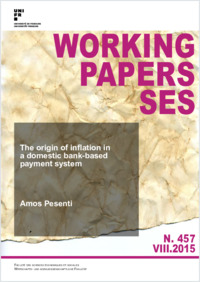The origin of inflation in a domestic bank-based payment system
BP2-STS
-
01.08.2015
31
English
This paper shows how a disorderly-working bank-based payment system negatively affects monetary stability. This occurs when firms invest their profits in production with the aim of forming and accumulating (fixed) capital, while at the same time banks carry out the payment of workers’ wages and enter the corresponding payment order in the architecture for domestic payments. In fact, if the payment of wages is financed with profits, this payment operation corresponds to an emission of (empty) money without it being endowed with value, to wit, purchasing power. It follows that the existing value of money is “diluted” in a greater amount of money units, so much so that the current purchasing power of each unit of money is reduced. This monetary phenomenon can be defined as inflation, which, in turn, exerts an upward pressure on the general price level. A structural reform of the bank-based payment system, as suggested in this paper, may consequently improve the defective architecture for domestic payments and thereby promote long-run monetary stability.
- Collections
- Faculty
- Faculté des sciences économiques et sociales et du management
- Language
-
- English
- Classification
- Economics
- Series statement
-
- Working Papers SES ; 457
- License
-
License undefined
- Identifiers
-
- RERO DOC 256397
- RERO R008220616
- Persistent URL
- https://folia.unifr.ch/unifr/documents/304510
Statistics
Document views: 159
File downloads:
- Document: 365
